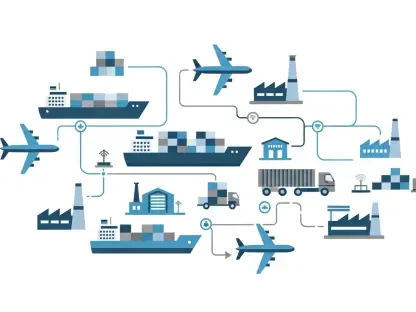The aviation and logistics industries, which form the backbone of global commerce, are facing a rapidly escalating threat landscape driven by sophisticated cyberattacks. These sectors are responsible for ensuring the smooth flow of goods around the world, making any disruption potentially catastrophic. In recent years, the susceptibility of these industries to various forms of cyber threats, including data leaks, ransomware, and system intrusions, has increased significantly. This alarming trend necessitates immediate and robust cybersecurity measures to safeguard the intricate web of global supply chains.
The Economic Impact of Cyberattacks
Rising Costs and Diverse Threats
Silvana Bruno, Managing Director and Head of Cybersecurity at Networker Solutions GmbH, highlighted the ease with which cybercriminals can exploit vulnerabilities within aviation and logistics systems. A survey conducted by the digital association Bitkom underscores the staggering financial toll these cyberattacks take on the German economy, amounting to 206 billion euros annually. Notably, pure cyberattacks contribute 148 billion euros, or 72 percent of this total, up from 59 percent in 2021. This significant rise underscores the growing severity and complexity of cyber threats.The spectrum of cyber threats targeting these industries is vast and varied. Malware attacks, encompassing viruses, trojans, spyware, and ransomware, pose significant risks by infiltrating systems and exfiltrating valuable data. Denial-of-service (DoS) attacks aim to overload company servers, resulting in operational paralysis. Meanwhile, supply chain attacks exploit vulnerabilities in third-party systems to gain access to sensitive company data. The consequences are multifaceted, ranging from immediate financial losses to long-term reputational damage and the theft of critical information. The diversity and sophistication of these threats necessitate a multifaceted approach to cybersecurity.
Operational Disruptions and Reputational Damage
The financial repercussions of cyberattacks are only part of the broader impact. Operational disruptions caused by these attacks can cripple logistics and aviation companies, creating cascading effects throughout the supply chain. For instance, a ransomware attack may paralyze essential systems, delaying shipments and causing massive financial losses. This type of interruption not only affects the immediate victim but also has ripple effects on businesses and consumers reliant on timely deliveries.Reputational damage is another significant consequence of successful cyberattacks. In an age where data breaches frequently make headlines, the loss of sensitive customer or business information can undermine trust and tarnish a company’s reputation for years. The aviation and logistics sectors handle vast amounts of sensitive data, including personal information, financial records, and strategic business data. Any breach can lead to substantial long-term damage, affecting customer loyalty and business partnerships. The palpable fear of this reputational harm drives many companies to invest heavily in cybersecurity measures.
The Vulnerability of Small and Medium-Sized Enterprises
SMEs at Greater Risk
Small and medium-sized enterprises (SMEs) within the aviation and logistics sectors are particularly vulnerable to cyberattacks. Despite their crucial role in the global supply chain, many SMEs lack the resources and expertise needed to implement robust cybersecurity measures. Almost half of the companies surveyed (48 percent) expressed concerns over existential threats posed by potential cyberattacks. The complexity and volume of threats far exceed the capacity of many SMEs, leaving them as weak links in the broader security chain.The interconnected nature of the logistics industry compounds this vulnerability. SMEs often work closely with larger entities, creating a network where information and data are constantly exchanged. Any lapse in cybersecurity by a smaller company can expose the entire network to substantial risks. Cybercriminals are acutely aware of these vulnerabilities and frequently target smaller firms as entry points. Therefore, ensuring that SMEs bolster their cybersecurity capabilities is crucial for the overall resilience of the industry.
The Human Element and Insider Threats
While technology plays a critical role in cybersecurity, the human element remains a significant factor. Insider threats, whether intentional or accidental, pose unique challenges. Employees may inadvertently compromise security by falling victim to phishing scams or using weak passwords. In other cases, disgruntled employees could intentionally sabotage systems or leak sensitive information. Training and educating employees on cybersecurity best practices is therefore essential to mitigate these risks.Creating a cybersecurity culture within an organization requires more than just implementing technical solutions. It involves fostering a mindset where every employee understands the importance of cybersecurity and their role in maintaining it. Regular training sessions, clear communication of policies, and incentivizing good cybersecurity practices can all contribute to a safer work environment. As the threat landscape continues to evolve, staying vigilant and proactive is paramount.
A Unified Approach to Cybersecurity
Collaborative Efforts and Industry Standards
Addressing the cybersecurity challenges in the aviation and logistics sectors requires a unified and comprehensive approach. Companies must prioritize the implementation of industry standards and best practices to create a robust defense against cyber threats. Collaboration across different entities within the industry is vital for sharing insights and strategies. By working together, companies can enhance their collective security posture and present a formidable front against cyber threats.Cybersecurity is not a one-time effort but a continuous process of assessment, improvement, and adaptation. As cyber threats become increasingly sophisticated, companies must invest in advanced technologies like artificial intelligence and machine learning to anticipate and counteract new forms of attacks. Developing and adhering to a comprehensive cybersecurity framework can help organizations stay ahead of threats and minimize vulnerabilities.
The Role of Regulatory Bodies and Government Support
The aviation and logistics industries, which are crucial to global commerce, are grappling with an increasingly dangerous array of cyber threats that are growing more sophisticated by the day. These sectors are fundamental in ensuring the seamless movement of goods around the globe, making any disruption potentially devastating. Over recent years, these industries have become especially vulnerable to a variety of cyber threats, such as data breaches, ransomware attacks, and system infiltrations. This alarming rise in cyber vulnerabilities calls for urgent and comprehensive cybersecurity measures to protect the complex web of global supply chains. With the growing reliance on digital systems for tracking, communications, and operations, a single cyberattack can halt activities, disrupt supply chains, and create widespread economic fallout. As adversaries become more advanced, it’s imperative that aviation and logistics sectors not only adopt advanced security technologies but also enforce strict cybersecurity protocols and regular employee training. By doing so, these industries can better defend against cyber threats and ensure a resilient global trading system.









